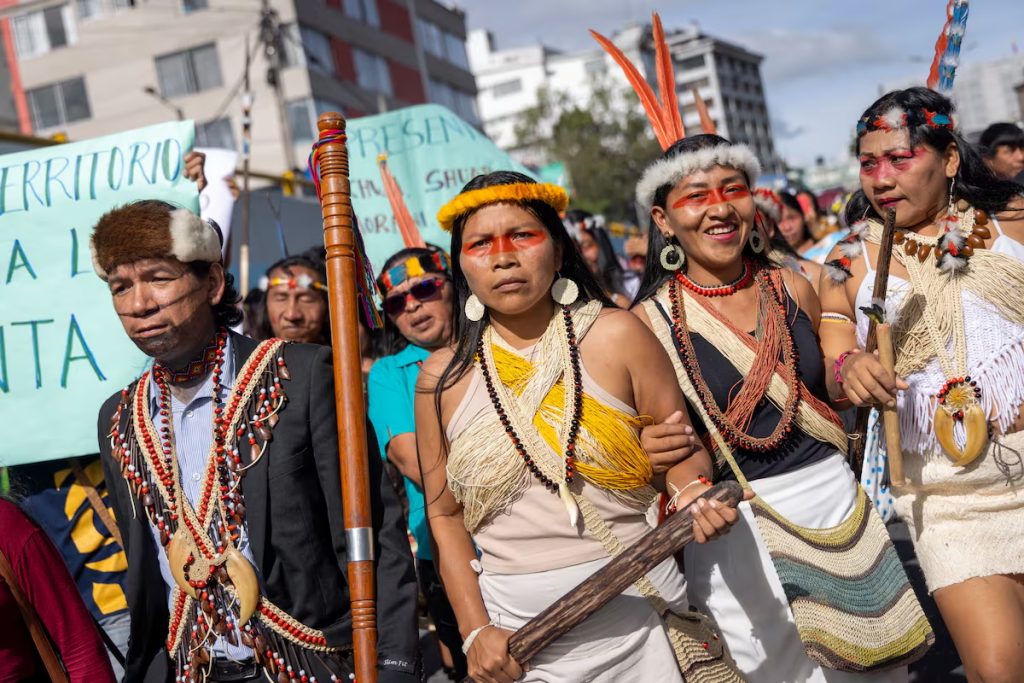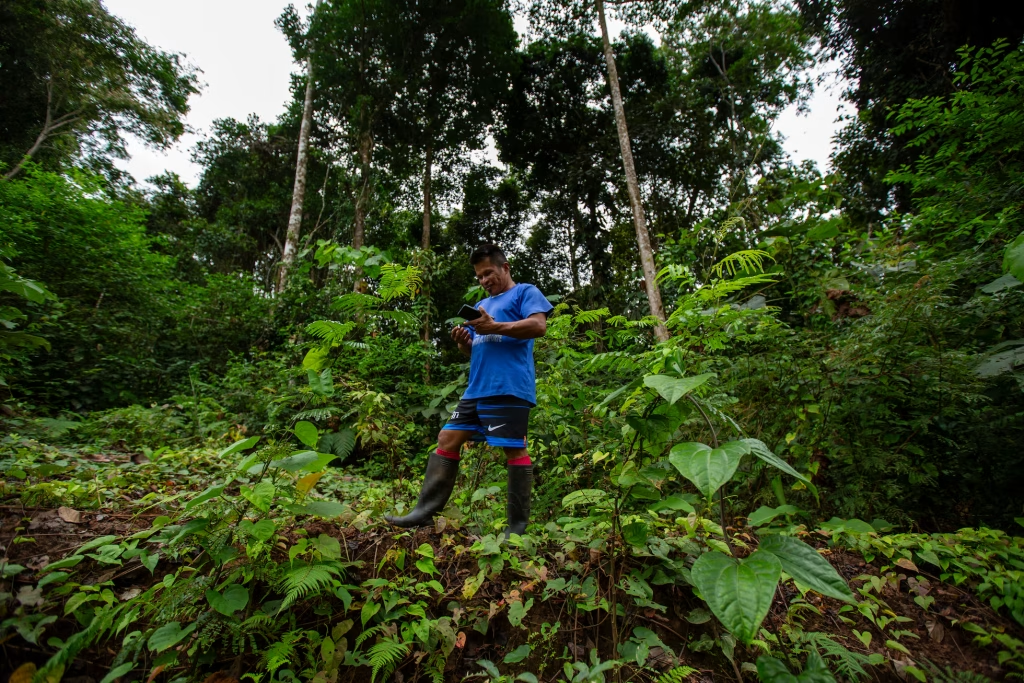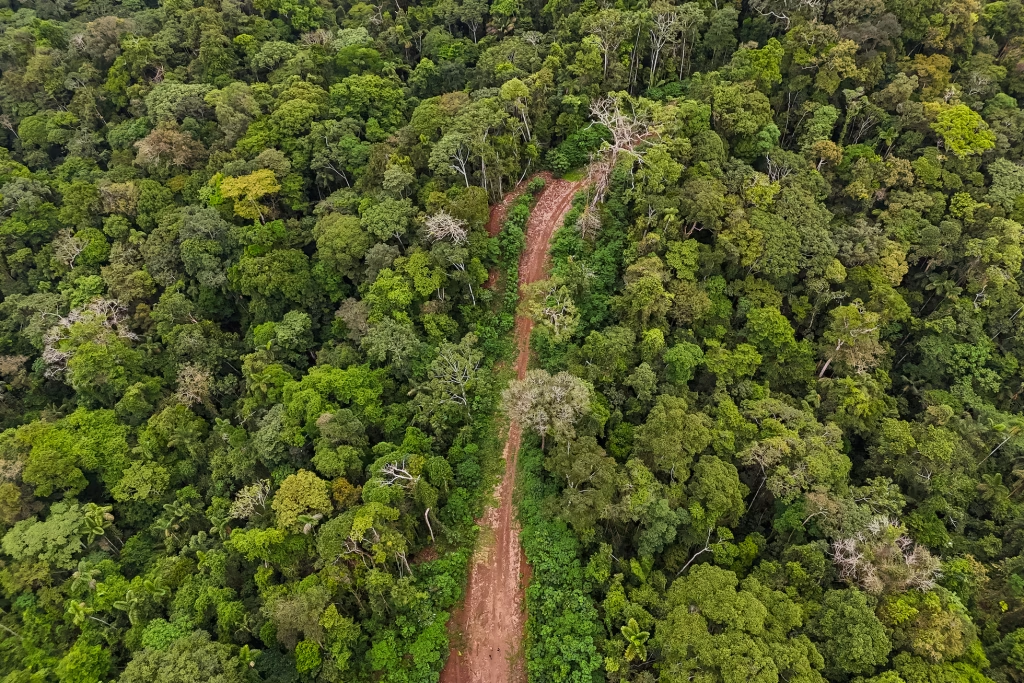Originally Published in Spanish in: EL PAÍS
I know that to many people, my house may appear to be a poor person’s house. This misperception is not their fault. Few outsiders come to the Amazon rainforest for the first time and know how to see things for what they truly are.
Perhaps that’s why so many governments and businessmen always want to demolish my house. They keep insisting and insisting, even telling us it’s for our own good. And it’s not just my house they want to demolish: It’s the home of all the Indigenous Peoples of the Amazon. It’s the rainforest itself that they want to destroy.
Ecuador’s President Daniel Noboa wants to auction off the Amazon to oil companies. In 2024, he announced his plan to carry out a new round of oil concessions, offering Indigenous territories in the Amazon – some of the most biodiverse forests in the world – as blocks to lease for oil exploitation. His government also claimed that it had already consulted the Indigenous Peoples of these areas and obtained our consent. But that wasn’t the case.
In April 2019, when I was president of the Waorani people, we sued the government. The Criminal Magistrate’s Court in Puyo issued a historic ruling on our case: It determined that the government of Ecuador had violated the rights of the Waorani people of Pastaza by holding an improper, performative “consultation” on oil exploration and exploitation in our territories. The ruling invalidated that supposed consultation, and it halted the oil bidding campaign in the so-called Block 22. It also derailed the government’s efforts at the time to auction off the future of the Amazon. “Today, life won,” we said that day.
But on that day, life had only won one battle.

We are now in the midst of an increasingly severe climate crisis. The Amazon is approaching a point of no return concerning deforestation and pollution. The agreement reached by government representatives at the United Nations Conference of the Parties meetings in Dubai in 2023 recognized the need to begin the transition from fossil fuels to renewable energy. Ecuador’s Minister of the Environment spoke in favor of this transition. Since then, Ecuador, like almost all other governments, has continued pursuing deforestation and the exploitation and burning of oil, while violating the rights of nature, children, future generations, and Indigenous Peoples.
In Ecuador, oil economists promised us health, education, and a deceptive idea they always call “development.” But more than sixty years later, oil extractivism has only brought deforestation, pollution, disease, death, and misery to the Amazon. The provinces with the most oil activity are the poorest in the country. What does this mean? It means that in the provinces where the oil industry despoils forests and Indigenous Peoples, the money that stays in the country is channeled into foreign debt payments and corruption. Meanwhile, the infant mortality rate of our region is the highest in the country. That’s why we fought in 2019 to stop the sale of our territories to oil companies.

It’s within this context that the Ecuadorian government is once again insisting on the same plans to sacrifice the most biodiverse and intact forests on the planet, to sacrifice the ancestral territories of Indigenous Peoples, to extract a few years’ worth of oil – the blood of our ancestors – from under our homes.
Daniel Noboa has already announced his intention to restart oil bidding in the Amazon, based on the flawed 2012 “consultation” that was invalidated by the court. His government proposes offering fourteen oil blocks totaling more than 2,300,000 hectares on the international market.
The government says everything is ready and that they have already consulted the communities living in these areas. But that is a lie, and the judicial system knows it is a lie. And international oil companies must hear this too: They did not consult us, we do not want extractivist companies in our territories, and we will fight to defend our rights.
Shortly after our victory in 2019, the Constitutional Court of Ecuador declared its interest in a long-term resolution of the Waorani case. The Court said it would evaluate whether the consultation process, as it operates currently, complies with the rights of Indigenous Peoples and the obligations of the State. If the Court decides that this is not the case, it could establish new standards for consultation, which could grant Indigenous communities greater autonomy over the future of our lives, our forests, and our own territories.
We are no longer living in the colonial era, when invaders read aloud “The Requerimiento” – the document informing us of Spain’s supposed right to conquest – before dispossessing us of our territory. But even so, the Court has continued to debate whether or not it’s acceptable for them to fly into our territories and offer us bottles of Coca-Cola and bread in exchange for signatures on a document written in a language other than our own. The court in Puyo has already said it’s not right. We’ve been saying this for over 500 years. And I will repeat it now: This is not a consultation, it’s theft.
Legal standards could include requirements such as: conducting the consultation in the language of the Indigenous communities; doing so within their territories and with their prior knowledge and participation in organizing the meetings according to their traditions; and consulting the entire affected population, not just a small percentage, as the State did in 2012 when they “consulted” 7% of the population at promotional events without translators.
If the Court were to fully resolve the Waorani case this year, the new round of oil concessions in our territories would be invalidated for violating the right to free, prior, and informed consent. As of the beginning of this year, the Court has not said a word on the matter for more than five years. We have gone to their offices repeatedly to demand that the judges act. And they haven’t.

It seems that the Constitutional Court of Ecuador is afraid of the power of its own voice. As Indigenous Peoples, we know all too well that it is difficult for judges to really hear us. We are accustomed to judges not wanting to receive us in their office building in Quito, and to their desire to limit and control the time we have to speak, the way we speak, or even the identity of those who speak to them. This doesn’t faze us. We know how to demand our rights and to make ourselves heard. But we were surprised that the Constitutional Court has simply ignored the historic ruling of the Pastaza court.
We have realized that if the Constitutional Court is to truly follow the 2019 ruling, the Court will have to stop the government’s efforts to sell our territories to oil companies without our consent. And the judges know, because it’s no secret, since we’ve told them upfront and will repeat it as many times as necessary: We will never give them our consent. Our forests and our territories are life itself. And life is not for sale. It is not meant to be bargained over, it is not for rent, it is not meant to be destroyed. The climate crisis itself is Mother Earth crying out and demanding respect.
What, then, scares them so much? Why won’t they allow for a resolution of our case? What are the judges in Quito afraid of? These are rhetorical questions. The fear is always the same: It is the fear of city dwellers of having to look into the eyes of the brave Indian from the jungle with his spear and his penetrating gaze; it is the fear of having to look into the eyes of the Indian who starters back without flinching, eyes that reflect the injustice of being discriminated against, silenced, and dispossessed; and it is the fear of having to face the gaze of the fearless Indigenous who will fight to the end for life.
With these rhetorical questions in our mouths, we bid farewell to 2024. We are happy to welcome 2025 with the news that the Constitutional Court has finally taken up our case, committing to issue a ruling that will create jurisprudence on the right to prior consultations in Indigenous territories.
After five years of silence, the Court has demonstrated its seriousness by committing to issue a ruling in the Waorani Resistance case. Now, the important thing is to pressure the Court to listen to the people by holding a hearing, and not simply base a ruling on written submissions. It is also urgent that this hearing be undertaken respectfully and with sufficient time to allow for intercultural dialogue and not just an ordinary court process.
The Constitutional Court can still do what is right. We are not asking for anything: We are demanding respect for the Amazon, Mother Earth, and our territories. And we will keep fighting and exercising our rights.




